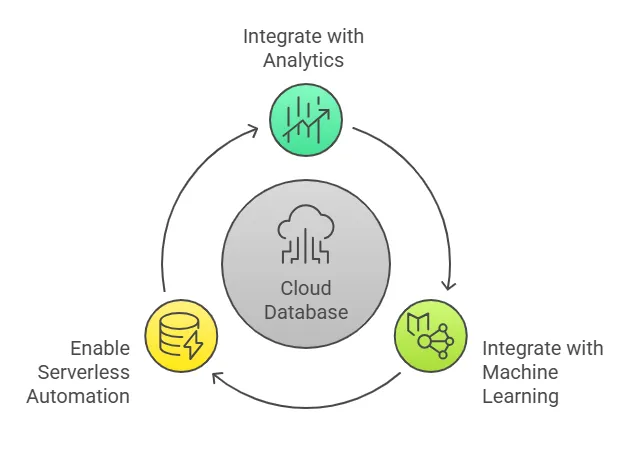Growing businesses can’t afford downtime, complex infrastructure, or rigid systems. Traditional databases often come with high upfront costs, maintenance challenges, and limited flexibility. According to Statista, over 60% of corporate data is now stored in the cloud, and this number is expected to continue growing.
Jason Harlam, Business Development Manager at Technology Advisory Group, says, “Modern businesses need platforms that don’t slow them down. Cloud databases help you scale fast without wasting resources.”
This blog breaks down the most critical cloud database benefits. You’ll learn how they impact cost, performance, security, and how easily your business can grow without adding more IT management problems.
Build a Leaner, Smarter Data InfrastructureWe help you replace costly, rigid systems with scalable cloud databases that just work. |
1. Scalability Without Hardware Overheads
Traditional infrastructure cannot keep pace with the speed of digital business. Buying new servers or storage can slow down progress and create delays. Cloud databases provide immediate scalability without requiring the purchase of physical hardware.
This means your system can grow or shrink based on demand. You won’t have to overpay for unused capacity or scramble during peak usage.
Key cloud database advantages in scalability include:
- Elastic Resources: You can add or remove computing power, storage, or memory as needed. This flexibility supports seasonal traffic changes, product launches, or business expansion. There is no need to pause your operations or wait for procurement.
- No Physical Limits: Because everything runs on virtual infrastructure, scaling is handled digitally. There are no delays caused by hardware availability, installation, or shipping.
- Real-Time Forecasting: Cloud systems scale based on actual usage. This keeps your infrastructure lean and budget predictable. You avoid spending on capacity you may never use.
2. Lower Cost and Higher Efficiency
Cost control is one of the top reasons businesses switch to cloud databases. Cloud computing cuts upfront startup costs, including setup and maintenance, with 94% of IT professionals in an OpsRamp survey confirming its cost-saving benefits.
Traditional database systems require large upfront investments in servers, facilities, and skilled staff. Cloud databases reduce costs by switching from fixed capital expenses to variable operational ones.
You pay for what you use, which improves financial flexibility and reduces long-term risk.
Cloud database benefits related to cost and efficiency include:
- Usage-Based Billing: Cloud platforms charge based on actual resource consumption. You avoid overcommitting budgets and paying for unused capacity.
- No Equipment Maintenance: Cloud providers manage all hardware, including repairs, patches, and updates. Your internal team no longer needs to spend time or money on physical upkeep.
- Smaller IT Footprint: You need fewer IT staff to manage the infrastructure. This reduces hiring, training, and operational costs. Your team can focus more on strategic projects.
This model is ideal for startups and growing companies seeking to remain lean while leveraging powerful IT capabilities.
3. Reliable Performance and Disaster Recovery
System reliability has a direct impact on revenue, customer satisfaction, and operational efficiency. Cloud databases are built on distributed systems with built-in redundancy and disaster recovery features.
If one component fails, another is ready to take over. You don’t need to design these systems yourself; they’re part of the service.
Reliability features include:
- Multi-Zone Redundancy: Data is stored across multiple data centers or regions. If one location fails, another one ensures continuity. This is managed automatically by your cloud provider.
- Automated Backups: Backups happen on a regular schedule. You can recover lost data quickly after incidents without a complex process.
- Integrated Disaster Recovery: Cloud platforms offer multi-region failover options. Your operations stay online during regional issues without needing a separate recovery plan.
4. Fast Deployment and Easy Access
Speed is crucial when launching products or responding to market changes. Cloud databases are available within minutes and require minimal setup.
This shortens your deployment time and helps your teams work more efficiently.
Deployment advantages include:
- Quick Provisioning: Spin up databases in just a few clicks. Developers don’t need to wait on infrastructure, which accelerates delivery.
- Remote Team Access: Your team can access and manage data securely from anywhere. This supports remote work and global collaboration.
- Less Time on Maintenance: Cloud platforms manage routine updates, scaling, and uptime monitoring. This frees up your developers to focus on application logic.
These features lead to faster project completion and better alignment with business needs.
| More resources you might like: |
5. Built-In Security and Compliance Features
Security is a critical concern for all businesses. Cloud databases offer baseline protections that meet industry standards. You can also configure them to match your organization’s specific security policies.
These protections reduce your risk and help you stay compliant.
Security and compliance features include:
- Data Encryption: All data is encrypted both at rest and in transit. This makes it harder for unauthorized users to access your information.
- Access Controls: Use role-based access to restrict who can read, write, or modify data. Permissions can be adjusted as your teams change.
- Regulatory Compliance: Most cloud platforms meet key certifications like SOC 2, HIPAA, and ISO 27001. This makes it easier to align with legal requirements and simplify audits.
- Shared Responsibility: You handle user access and data classification. The provider secures the infrastructure. This division helps you stay focused without compromising security.
6. Integration with Other Cloud Tools

Databases do not operate in isolation. You need them to work with other tools like analytics platforms, machine learning models, or automation systems. Cloud databases are built to integrate easily.
These integrations reduce development time and enhance the efficiency of your systems.
Integration features include:
- Analytics Compatibility: Connect your database directly to analytics platforms. This lets you generate real-time insights without duplicating data.
- Machine Learning Integration: Send structured data into your models without complex prep work. This supports AI-driven projects without requiring extra infrastructure.
- Serverless Automation: Trigger workflows based on database activity. This supports real-time decision-making and automation.
Who Benefits Most from Cloud Databases?
Cloud databases are utilized across various industries to meet specific requirements. Their flexibility and efficiency make them especially valuable for:
- Fintech handles sensitive data and high transaction volumes. Cloud improves performance and compliance. According to CloudSecuretech, the typical financial services company relies on over 1,000 cloud services to support its operations.
- E-commerce: Experiences rapid traffic changes during promotions or holidays. Cloud databases scale automatically.
- SaaS Companies: Must deliver reliable service to users in different locations. Cloud platforms support global access and high uptime. SaaS dominates the cloud service market, accounting for the largest share at 36.6%.
Cloud vs On-Premise Databases
Cloud vs. on-premises systems often boils down to agility, cost, and control. This table helps you compare the two at a glance.
| Feature | Cloud Database | On-Premise Database |
| Initial Investment | Low | High (hardware/setup) |
| Scalability | Instant, on-demand | Manual, resource-limited |
| Maintenance | Provider-managed | In-house responsibility |
| Security Compliance | Certified frameworks | Custom implementation |
| Global Access | 24/7 via the internet | Internal network only |
| Disaster Recovery | Built-in | Requires planning/setup |
| Integration with Cloud Services | Native compatibility | Requires manual setup |
This view can help you evaluate which model fits your business growth plans.
Partner with Technology Advisory Group for Smarter Cloud Adoption
Cloud databases simplify data management. They reduce cost, improve reliability, and scale without requiring a large IT footprint. For most companies, the benefits far outweigh the limitations.
At Technology Advisory Group, we help businesses take advantage of cloud systems. We have over 75 clients and manage more than 1500 endpoints, computers, and servers.
| Discover Trusted Cybersecurity Services Near You
|
We focus on performance, reliability, and long-term value. Want to see how cloud databases can support your business? Contact us for a no-pressure consultation.
Schedule Your Cloud Services Consultation
Ready to make a move to the cloud? TAG is ready to help with any or all cloud services from a private cloud, public cloud, or Microsoft 365 services.


